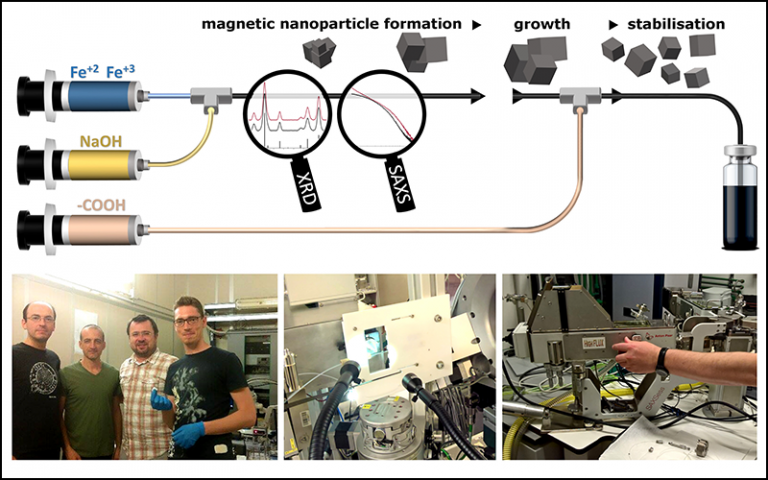Combining forces to unravel the mysteries of magnetic nanoparticle formation
13 July 2020

To unravel the mysteries of magnetic iron oxide nanoparticles (IONPs) formation, researchers at UCL including Dr Maximilian Besenhard, Prof Nguyen Thanh and Prof Asterios Gavriilidis teamed up with groups at Universidade de Lisboa, as well as Graz University of Technology and the Elettra Sincrotrone Trieste, which are part of the Central European Research Infrastructure Consortium (CERIC).
IONPs have emerged as one of the significant nanomaterials in biomedicine. Their low toxicity and biodegradability allow their use in drug delivery systems, for contrast agents for magnetic resonance imaging and therapeutic agents for magnetically induced hyperthermia cancer treatment. Production of IONPs meeting all biomedical requirements is challenging, as most lab-based syntheses suffer from low productivity and reproducibility issues. To guarantee that successful syntheses are not a “one-off” but can be performed reproducibly at all scales, it is vital to understand how IONPs form. However, for the most common synthetic procedures, the high speed of IONPs formation makes their characterisation during the early stages of formation almost impossible.
But only almost! By uniting forces, it was possible to combine a flow chemistry approach using steady-state operation to locally “freeze” transient reaction states with CERICs multi-technique approach combining in-situ synchrotron XRD and SAXS. This combined effort provided for the very first time precious information for the early stages of IONPs synthesis.
This approach was first used successfully in LaGrow & Besenhard et al. (Nanoscale, 2019, 11, 6620-6628), and more recently in Besenhard et al. (Chem. Eng. J., 2020, 125740). Still, myth busting is by no means over, as this fruitful collaboration between the MAFuMa project at UCL (PI Asterios Gavriilidis) and the Nano-analytics for Pharmaceutics project at CERIC (PI Aden Hodzic) continues. The next target are studies on magneto-liposomes, as a novel kind of nano-drug delivery systems.
Further information:
- Press Release: Improved nanoparticles towards more effective drug formulation, delivery and cancer treatment
- Nano-analytics for Pharmaceutics
- Manufacturing Advanced Functional Materials (MAFuMa)
- LaGrow & Besenhard et al. (Nanoscale, 2019,11, 6620-6628)
- Besenhard et al. (Chem. Eng. J., 2020, 125740).
 Close
Close

